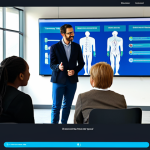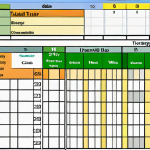Honestly, remember when job security felt like a given? It seems like the only constant now is change itself, a bewildering whirlwind that has many of us feeling a bit unmoored.
I’ve personally navigated a few career shifts, and let me tell you, it’s never just about updating your resume; it’s a complete recalibration of your skills and mindset.
This era of perpetual evolution makes the role of a literacy educator not just important, but absolutely critical. They’re no longer just teaching basic reading and writing; they’re preparing us for an entirely new working landscape.
The buzz around AI replacing jobs, the rise of the gig economy, and the sheer necessity of digital fluency means that ‘literacy’ itself has broadened profoundly.
It’s about critically evaluating information in a post-truth world, understanding complex data, and possessing the soft skills like adaptability and resilience that truly empower job transitions.
I’ve seen firsthand how a lack of these updated ‘literacies’ can leave even highly skilled individuals struggling to pivot. The future demands not just new job titles, but fundamentally new ways of thinking and learning, a continuous process of unlearning and relearning.
This is where the magic of modern literacy education and thoughtful job change management truly intertwine, offering a lifeline in a volatile employment market.
Let’s delve deeper into this below.
It seems like the only constant now is change itself, a bewildering whirlwind that has many of us feeling a bit unmoored. I’ve personally navigated a few career shifts, and let me tell you, it’s never just about updating your resume; it’s a complete recalibration of your skills and mindset.
This era of perpetual evolution makes the role of a literacy educator not just important, but absolutely critical. They’re no longer just teaching basic reading and writing; they’re preparing us for an entirely new working landscape.
The buzz around AI replacing jobs, the rise of the gig economy, and the sheer necessity of digital fluency means that ‘literacy’ itself has broadened profoundly.
It’s about critically evaluating information in a post-truth world, understanding complex data, and possessing the soft skills like adaptability and resilience that truly empower job transitions.
I’ve seen firsthand how a lack of these updated ‘literacies’ can leave even highly skilled individuals struggling to pivot. The future demands not just new job titles, but fundamentally new ways of thinking and learning, a continuous process of unlearning and relearning.
This is where the magic of modern literacy education and thoughtful job change management truly intertwine, offering a lifeline in a volatile employment market.
Let’s delve deeper into this below.
Redefining “Literacy” for the 21st Century Workforce

Honestly, I remember thinking literacy was just about being able to read a book or write a coherent email. Oh, how naive I was! The landscape has shifted so dramatically that what we once considered foundational knowledge barely scratches the surface today. Modern literacy isn’t merely about parsing words; it’s about making sense of an increasingly complex, interconnected, and often overwhelming world of information. It means having the critical thinking skills to differentiate between credible news and blatant misinformation, a skill that feels more vital than ever when you’re trying to make informed career decisions or understand market shifts. For instance, when I was contemplating my move from corporate marketing to full-time content creation, the sheer volume of conflicting advice online was paralyzing. I quickly learned that true literacy in this context meant not just consuming information, but dissecting it, cross-referencing, and understanding the inherent biases that might exist. It’s about seeing the bigger picture and how different data points connect, rather than just isolated facts. This expanded definition of literacy directly impacts our ability to adapt, learn new skills, and thrive in roles that might not even exist yet.
1. From Text Comprehension to Digital Fluency
The journey from basic reading to digital fluency is perhaps the most significant transformation in modern literacy. It’s not just about knowing how to use a computer; it’s about understanding the underlying logic of digital platforms, navigating complex software interfaces, and even having a basic grasp of data ethics and cybersecurity. I’ve personally felt the sting of digital illiteracy when trying to master new CRM software or analytics tools for a client project. It wasn’t enough to just click around; I needed to understand the *why* behind the interface design and the *how* the data was being processed. This includes everything from effectively using search engines to find precise information, to understanding algorithms that curate our online experiences. Without this foundational understanding, even the simplest tasks can become insurmountable hurdles, slowing down productivity and making career transitions unnecessarily difficult. It’s a foundational layer that underpins almost every modern profession, and frankly, I see it as non-negotiable for future employability.
2. Cultivating Information and Data Literacy
In an age flooded with data, simply being able to read charts or understand statistics isn’t enough. Information and data literacy extend to being able to interpret complex datasets, understand predictive analytics, and even question the source and methodology behind the numbers. I’ve been in situations where a simple pie chart was presented, but upon deeper inspection, the underlying data was flawed or selectively chosen to support a particular narrative. My ability to ask critical questions about the data, its collection, and its potential biases directly impacted project outcomes and, more importantly, my professional integrity. This isn’t just for data scientists; every professional, from marketing specialists analyzing campaign performance to healthcare providers evaluating research, needs to possess this level of data acumen. It empowers us to make smarter decisions, spot emerging trends, and avoid being misled by misleading figures, which is absolutely crucial when assessing new career paths or industry shifts.
Mastering the Soft Skills That Truly Matter Now
Remember when ‘soft skills’ felt like an optional extra, a nice-to-have but not a core competency? Well, those days are long gone. In this incredibly fluid job market, I’ve personally found that these ‘human’ skills are not just important, they are often the *most* critical factors in securing a new role, thriving in it, and successfully navigating career pivots. It’s the ability to truly collaborate, to communicate with clarity and empathy, and to adapt to unforeseen challenges that sets individuals apart. I’ve witnessed firsthand how a technically brilliant colleague struggled because they couldn’t effectively convey their ideas or work constructively within a team. On the flip side, I’ve seen individuals with less specialized technical knowledge excel because of their exceptional problem-solving abilities and emotional intelligence. These skills are inherently human and much harder for AI to replicate, making them incredibly valuable currency in today’s workforce. They are the glue that holds teams together and the oil that smooths the gears of innovation.
1. The Power of Adaptability and Resilience
If there’s one skill I preach about constantly, it’s adaptability. The world around us is changing at breakneck speed, and if you’re not willing to adjust, learn new ways of doing things, and embrace uncertainty, you’re going to struggle. I’ve had moments where a project’s entire scope changed overnight, or a new technology rendered a previously vital skill almost obsolete. In those moments, my ability to pivot quickly, absorb new information, and approach challenges with a “how can I make this work?” mindset was paramount. Resilience goes hand-in-hand with this; it’s about bouncing back from setbacks, learning from failures, and maintaining a positive outlook even when things feel overwhelming. I’ve definitely had my share of rejections and project failures, but each one became a learning opportunity that strengthened my resolve and refined my approach. Without this core resilience, the constant changes in the job market can feel less like opportunities and more like existential threats, which is a truly draining way to live and work.
2. Collaborative Communication and Emotional Intelligence
Working in silos is largely a thing of the past. Today’s projects, whether in a large corporation or a small startup, are inherently collaborative, often spanning different departments, time zones, and even cultural backgrounds. This makes effective communication absolutely indispensable. But it’s not just about speaking clearly; it’s about active listening, understanding non-verbal cues, and tailoring your message to your audience. I’ve seen countless misunderstandings arise simply because someone failed to truly listen or considered the other person’s perspective. Emotional intelligence, or EQ, takes this a step further. It’s the ability to understand and manage your own emotions, and equally important, to perceive and influence the emotions of others. When I’ve been able to empathize with a client’s frustrations or understand a colleague’s stress, it’s transformed difficult conversations into productive collaborations. This leads to stronger team dynamics, better problem-solving, and a far more pleasant working environment, which are all critical for career longevity and happiness.
The Crucial Role of Continuous Unlearning and Relearning
It’s a bit of a mind-bender, isn’t it? The idea that some of the things we’ve painstakingly learned might actually hold us back. But that’s the brutal truth of our current professional landscape. I’ve personally experienced moments where a deeply ingrained method or a ‘tried-and-true’ approach I relied upon suddenly became inefficient, or even obsolete, thanks to new technology or evolving industry best practices. It’s a humbling process, acknowledging that what made you successful yesterday might not be enough for tomorrow. This is where the concept of ‘unlearning’ becomes as vital as ‘relearning.’ It’s about letting go of old paradigms, assumptions, and even skills that no longer serve you, clearing mental space for new knowledge and approaches. This isn’t about forgetting everything you know; it’s about actively challenging your own assumptions and being open to new, often better, ways of working. I often liken it to updating my phone’s operating system – sometimes you have to delete old, clunky apps to make room for newer, more efficient ones. It demands a level of humility and intellectual curiosity that can be uncomfortable but is absolutely essential for sustained career growth.
1. Embracing a Growth Mindset and Intellectual Humility
The foundation of effective unlearning and relearning is a robust growth mindset, coupled with a healthy dose of intellectual humility. I used to think that being an “expert” meant having all the answers. Now, I realize true expertise lies in knowing how to find answers, admit when you don’t know, and be open to being wrong. This shift in perspective was transformative for me. Instead of feeling threatened by new ideas or technologies, I started seeing them as opportunities to expand my capabilities. Intellectual humility means recognizing that your current knowledge is always partial and provisional. It means actively seeking out different viewpoints, listening to those with less experience but fresh perspectives, and not being afraid to say, “I don’t know, but I’m eager to learn.” This mindset isn’t just about personal development; it makes you a far more adaptable and valuable asset in any team, ready to tackle unknown challenges rather than clinging to outdated methods. It’s genuinely liberating to realize you don’t have to be perfect; you just have to be willing to grow.
2. Practical Strategies for Skill Adaptation and Obsolescence
So, how do you actually *do* this unlearning and relearning? It’s not always easy, but I’ve found a few practical strategies incredibly effective. Firstly, regularly auditing your current skills against industry trends is crucial. Are there tools or platforms gaining traction that you’re unfamiliar with? Secondly, creating a dedicated learning schedule, even if it’s just an hour a week, for online courses, industry webinars, or even just reading specialized articles, makes a huge difference. For instance, when I saw the shift towards video content, I proactively sought out tutorials and workshops, even though I had no prior experience. Lastly, actively seeking feedback, especially from those who are more current with new technologies or methodologies, can expose blind spots. This might involve formal mentorship or just informal conversations. It’s about consciously identifying skills that are becoming obsolete – perhaps an old software program or a manual process that’s now automated – and then actively replacing them with new, relevant ones. It’s a proactive stance against professional stagnation, making sure you’re always equipped for what’s next.
Navigating the Gig Economy and Portfolio Careers with Confidence
The traditional 9-to-5, single-employer career path, while still existing, feels less like the only option and more like one choice among many now. I’ve personally dipped my toes into the gig economy, and let me tell you, it’s a completely different ballgame than working for one company your whole life. It offers incredible flexibility and autonomy, but it also demands a unique set of skills and a completely different mindset. The security blanket of a steady paycheck and benefits can be replaced by the exhilarating, yet sometimes terrifying, freedom of being your own boss, managing multiple clients, and constantly seeking new opportunities. It’s a shift from being an employee to being a small business owner of one. This means not just focusing on your core technical skills, but also becoming adept at self-marketing, client management, financial planning, and project negotiation. It’s a dynamic, ever-evolving landscape where your reputation and network are your most valuable assets. The days of simply showing up and doing your job are over; now, you are the product, the marketer, and the operations manager all rolled into one. It’s challenging, yes, but also incredibly rewarding once you get the hang of it.
1. Developing a Robust Personal Brand and Network
In a world where you might be juggling several clients or constantly looking for the next freelance project, your personal brand is everything. It’s not just a fancy buzzword; it’s the professional identity you project, the reputation that precedes you, and the value proposition you offer. I’ve spent countless hours refining my online presence, from my LinkedIn profile to my portfolio website, ensuring they clearly articulate what I do and how I can help. But it’s not just about what you put online; it’s about the interactions you have, the quality of your work, and how you treat people. Building a strong professional network is equally critical. It’s not about collecting business cards; it’s about building genuine relationships with people who can offer advice, introduce you to opportunities, or even become future clients. I’ve found that most of my best freelance work has come through referrals from people I genuinely connected with, rather than cold outreach. Your network is your safety net, your sounding board, and your source of future projects.
2. Managing Multiple Projects and Income Streams
The beauty of a portfolio career or gig work is the diversification of income, but that also comes with the challenge of managing multiple projects simultaneously. It’s no longer about one boss and one set of priorities. Now, you have several “bosses” (clients), each with their own deadlines, expectations, and communication styles. I’ve learned the hard way the importance of meticulous time management, clear communication about availability, and setting realistic expectations from the outset. Over-promising and under-delivering is a sure-fire way to ruin your reputation in the gig economy. This also extends to managing your finances. With income streams that can fluctuate, budgeting, saving, and understanding tax implications become vital. It’s a huge shift from having a predictable monthly paycheck. I’ve had to become much more disciplined about setting aside money for taxes and lean months, and constantly tracking my cash flow. It’s a lot of hats to wear, but the reward is a greater sense of control over your professional destiny.
Building Your Personal Brand and Professional Narrative
In today’s interconnected world, simply having a good resume isn’t enough anymore. What truly sets you apart is the story you tell about yourself – your personal brand and professional narrative. I’ve seen this play out in countless job interviews and client pitches: it’s not just about what you’ve done, but how you frame it, what unique value you bring, and how you articulate your passion and purpose. This isn’t about being flashy or inauthentic; it’s about clearly defining who you are professionally, what you stand for, and how your unique experiences and skills solve problems for others. Think of it like this: if someone googled your name, what story would they find? Would it be a consistent, compelling narrative that highlights your strengths and aspirations? I’ve worked tirelessly on mine, ensuring that my online presence, from LinkedIn to my personal website, resonates with the message I want to convey about my expertise and values. It’s an ongoing process of self-reflection and strategic communication, crucial for anyone looking to make a meaningful impact or pivot their career effectively.
1. Crafting Your Unique Value Proposition
Before you can tell your story, you need to know what story you’re telling. This means identifying your unique value proposition (UVP). What makes you different? What specific problems do you solve? For me, it was realizing that my diverse background in marketing, writing, and strategic planning allowed me to approach content creation not just creatively, but also with a strong business acumen. This became my UVP. It’s not just about listing skills; it’s about connecting those skills to tangible benefits for an employer or client. Think about a time you excelled: what was the specific challenge, what actions did you take, and what were the measurable results? These anecdotes are the building blocks of your UVP. Once you truly understand what makes you unique and valuable, you can confidently articulate it in interviews, on your resume, and across all your professional interactions. It’s the core message that permeates every aspect of your professional identity.
2. Leveraging Digital Platforms for Storytelling and Visibility
Once you’ve defined your personal brand, the next step is to amplify it across relevant digital platforms. LinkedIn is obviously a powerhouse, but don’t stop there. Consider a personal website or a blog if you’re in a creative field, or a curated portfolio on platforms like Behance or GitHub if you’re a designer or developer. The key is consistency in your message and visuals across all platforms. I regularly update my LinkedIn profile with new projects, articles I’ve written, or relevant industry insights, ensuring it’s a dynamic representation of my current skills and interests. Engaging in industry discussions, sharing valuable content, and connecting with thought leaders also boosts your visibility and demonstrates your expertise. This isn’t about being self-promotional in an obnoxious way; it’s about thoughtfully contributing to your professional community and making it easy for opportunities to find you. Remember, in today’s world, if you’re not visible online, you’re practically invisible professionally.
Let’s look at how skills translate across traditional and modern career paradigms:
| Skill Category | Traditional Career Focus | Modern Career (Gig/Portfolio) Focus |
|---|---|---|
| Literacy | Reading, Writing, Basic Math | Digital Fluency, Data Interpretation, Critical Thinking, AI Literacy, Media Analysis |
| Communication | Formal Reports, Presentations, Team Meetings | Cross-cultural Collaboration, Virtual Communication, Persuasion, Empathy, Client Negotiation |
| Problem-Solving | Following Established Procedures, Troubleshooting | Adaptive Thinking, Innovation, Strategic Foresight, Navigating Ambiguity, Creative Solutions |
| Adaptability | Learning New Company Procedures | Rapid Skill Acquisition, Unlearning Old Methods, Resilience to Change, Agile Mindset, Embracing Uncertainty |
| Self-Management | Meeting Deadlines, Following Instructions | Proactive Goal Setting, Time Blocking, Financial Acumen, Personal Branding, Client Management, Networking |
The Future-Proof Mindset: Embracing Agility and Innovation
If there’s one thing I’ve learned navigating the tumultuous waters of career changes, it’s that a static mindset is a career killer. The idea of being “future-proof” isn’t about having a crystal ball to predict the next big trend, but rather about cultivating an internal resilience and flexibility that allows you to thrive regardless of what comes your way. It’s an embrace of agility – the ability to move quickly and easily – and a relentless pursuit of innovation, even in your own work habits. I’ve had to continually re-evaluate my processes, experiment with new tools, and challenge my own assumptions about how work ‘should’ be done. This isn’t always comfortable; in fact, it’s often quite challenging to step outside of what feels familiar and safe. But I’ve personally seen the immense benefits of this approach. It leads to continuous learning, opens doors to unexpected opportunities, and, crucially, reduces the anxiety that comes with an ever-changing job market. It’s about being proactive rather than reactive, always looking for ways to improve and evolve, both professionally and personally. This mindset isn’t just for entrepreneurs; it’s for everyone hoping to stay relevant and engaged in their chosen field.
1. Fostering a Culture of Experimentation and Risk-Taking
To truly embrace innovation, you have to be willing to experiment and, yes, take calculated risks. This doesn’t mean throwing caution to the wind, but it does mean being comfortable with the idea that not every experiment will succeed. In my own work, I’ve tried out new content formats that flopped, pitched ideas that were rejected, and invested time in learning tools that ultimately weren’t a good fit. But each of those ‘failures’ provided invaluable lessons and nudged me closer to what *did* work. It’s about creating a personal “fail fast, learn faster” ethos. Within organizations, this translates to encouraging employees to prototype new ideas, test different approaches, and not penalize honest attempts that don’t pan out. I believe fostering this kind of safe environment for experimentation is crucial for both individual growth and organizational adaptability. Without it, fear of failure stifles creativity and leaves individuals and companies stuck in outdated ways of working, ultimately losing ground to more agile competitors.
2. Cultivating Emotional Intelligence and Self-Awareness for Growth
Finally, a truly future-proof mindset is deeply rooted in emotional intelligence and self-awareness. It’s about understanding your own strengths, weaknesses, triggers, and aspirations, and then using that knowledge to guide your professional journey. I’ve found that my biggest breakthroughs often came from moments of deep self-reflection, understanding why a certain project stressed me out, or recognizing when I was truly passionate about a new skill. This self-awareness allows you to identify areas for growth, choose learning paths that genuinely excite you, and navigate challenging professional relationships with greater grace. Emotional intelligence, as discussed earlier, extends to understanding others, but it begins with understanding yourself. When you know yourself well, you can better anticipate how you’ll react to change, what kind of work environments you thrive in, and what skills you truly need to cultivate for your long-term satisfaction and success. It’s the ultimate internal compass in a world that’s constantly shifting beneath our feet.
Closing Thoughts
As we wrap up this deep dive into the ever-evolving world of work, I hope you feel a renewed sense of empowerment, not anxiety. The constant change isn’t a threat; it’s an invitation to grow, to adapt, and to redefine what success looks like on your own terms. I’ve personally found immense liberation in embracing this fluidity, seeing each shift as an opportunity to learn something new and connect with incredible people. It’s about building a robust internal compass, one that guides you through the unpredictable currents of our modern economy. So, take a deep breath, trust in your innate human capacity for learning, and remember that your journey is uniquely yours.
Useful Resources & Tips
1. Online Learning Platforms: Platforms like Coursera, edX, LinkedIn Learning, and Udemy offer a vast array of courses, from technical skills to soft skills, often taught by university professors or industry experts. Many offer certifications or specializations that can boost your resume.
2. Professional Networking Sites: Beyond LinkedIn, explore industry-specific forums, local meetups (virtual or in-person), or professional organizations relevant to your field. True networking is about building genuine relationships, not just collecting contacts.
3. Mentorship Programs: Seek out mentors, either formally through programs or informally by reaching out to individuals whose careers you admire. Their insights, advice, and connections can be invaluable as you navigate career transitions.
4. Financial Planning for Gig Work: If you’re considering a portfolio career, look into resources on managing fluctuating income, understanding self-employment taxes (like those in the US or UK), and setting up robust savings plans. Sites like Investopedia or local government tax resources can be a good start.
5. Personal Branding Tools: Consider building a personal website or an online portfolio using platforms like Squarespace, WordPress, or even a simple Google Site. Ensure your professional social media profiles (LinkedIn, X, etc.) are consistent with your desired brand message.
Key Takeaways
Modern literacy transcends basic reading and writing, encompassing digital fluency, data literacy, and critical thinking. Soft skills like adaptability, resilience, collaborative communication, and emotional intelligence are now paramount for career success. Continuous unlearning and relearning are essential, requiring a growth mindset and intellectual humility. Navigating the gig economy demands a strong personal brand, robust networking, and effective multi-project management. Ultimately, cultivating an agile, innovative, and self-aware mindset is the most effective way to future-proof your career in this dynamic world.
Frequently Asked Questions (FAQ) 📖
Q: What exactly does “broadened literacy” mean in today’s job market, beyond just reading and writing?
A: Oh, this is the million-dollar question, isn’t it? When I first heard ‘literacy’ discussed in this new context, my mind initially went straight to just being tech-savvy.
But I’ve personally seen it’s so much more nuanced. It’s not just about whipping up a perfect email or knowing your way around a spreadsheet anymore. Think about it: we’re constantly bombarded with information, some true, some…
well, definitely not. So, “broadened literacy” means having the smarts to critically evaluate what’s real from what’s just noise – especially important in this “post-truth” world.
It’s also about understanding complex data, not just passively reading it, but seeing the story behind the numbers. And honestly, it boils down to those ‘human’ skills too: the adaptability to pivot when your industry shifts overnight, and the sheer resilience to bounce back when a job doesn’t pan out.
I’ve personally watched brilliant friends, super skilled in their old roles, absolutely flounder because they couldn’t or wouldn’t embrace these new ‘literacies.’ It’s humbling, really, seeing how crucial these seemingly “soft” skills are.
Q: Given the constant need for “unlearning and relearning,” how can individuals practically prepare for these continuous career shifts without feeling overwhelmed?
A: That phrase, “unlearning and relearning,” can feel like a heavy weight, right? Like you’re constantly chasing a moving target. What I’ve found, both in my own career twists and turns and watching others, is that it’s less about memorizing new facts and more about cultivating a curious, open mindset.
Practically speaking, it means becoming a lifelong student, but not in the formal, rigid sense. Maybe it’s setting aside an hour a week to explore a new industry trend on LinkedIn Learning, or diving into an online course on a platform like Coursera or edX that piqued your interest, even if it feels tangential at first.
I remember feeling completely out of my depth when I first had to grapple with data analytics for a marketing role; it felt like speaking a foreign language.
But by breaking it down, focusing on understanding concepts rather than just tools, and embracing the fact that I wouldn’t know everything immediately, it became manageable.
It’s about small, consistent efforts and, crucially, being kind to yourself through the inevitable stumbling blocks. Embrace that feeling of being a beginner again; it’s where real growth happens.
Q: What role do “soft skills” like adaptability and resilience truly play in this new job landscape, especially compared to technical skills?
A: Oh, the soft skills! For so long, they were often dismissed as secondary, mere “nice-to-haves” compared to the hard, measurable technical skills. But let me tell you, from what I’ve personally observed and experienced, they are absolutely the bedrock of navigating today’s volatile employment market.
Technical skills can get you the interview, but adaptability and resilience are what keep you employed and help you truly thrive through multiple career evolutions.
I’ve seen incredibly talented coders or engineers, brilliant at their craft, struggle immensely when their company underwent a major shift because they couldn’t adapt to new processes or a different team dynamic.
Conversely, I’ve watched people with less immediate technical prowess but immense resilience bounce back from layoffs, retrain quickly, and land on their feet in entirely new fields.
It’s like having a strong emotional core – when the world around you is constantly changing, these skills allow you to bend without breaking, to learn new technical skills faster, and to stay optimistic and proactive.
They’re not just important; they’re your primary survival kit.
📚 References
Wikipedia Encyclopedia
구글 검색 결과
구글 검색 결과
구글 검색 결과
구글 검색 결과
구글 검색 결과





